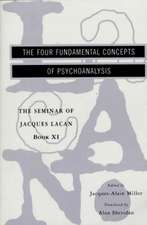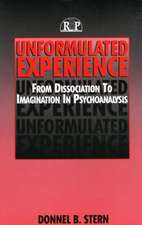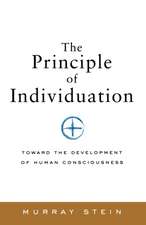The Adaptive Design of the Human Psyche: Psychoanalysis, Evolutionary Biology, and the Therapeutic Process
Autor Malcolm Owen Slavin, Daniel Kriegmanen Limba Engleză Hardback – 17 noi 1992
Addressing one of the most fundamental issues in any examination of human experience, this important new work connects evolutionary biological concepts to modern psychoanalytic theory and the clinical encounter. Synthesizing their years of experience in the practice of psychotherapy and psychoanalysis, the authors provide a comparative psychoanalytic map of current theoretical controversies and a new way of deconstructing the hidden assumptions that underlie Freudian, Ego Psychological, Kleinian, Object Relational, Self Psychological, and Interpersonal theories. In so doing, they provide a new vantage point from which to integrate competing models into a larger picture that more fully embraces the many facets of human nature. Moreover, they offer clinicians a new framework with which to understand and respond to the inevitable paradoxes and conflicts that arise in the therapeutic relationship.
Preț: 479.94 lei
Preț vechi: 505.21 lei
-5% Nou
Puncte Express: 720
Preț estimativ în valută:
91.85€ • 95.54$ • 75.83£
91.85€ • 95.54$ • 75.83£
Carte tipărită la comandă
Livrare economică 14-28 aprilie
Preluare comenzi: 021 569.72.76
Specificații
ISBN-13: 9780898627954
ISBN-10: 0898627958
Pagini: 336
Dimensiuni: 152 x 229 x 28 mm
Greutate: 0.71 kg
Ediția:New.
Editura: Guilford Publications
Colecția Guilford Press
ISBN-10: 0898627958
Pagini: 336
Dimensiuni: 152 x 229 x 28 mm
Greutate: 0.71 kg
Ediția:New.
Editura: Guilford Publications
Colecția Guilford Press
Public țintă
Postgraduate, Professional, Professional Practice & Development, and UndergraduateNotă biografică
Malcolm Owen Slavin, Ph.D., graduated from Yale, studied at the Sorbonne, and received a Ph.D. in psychology from Harvard University in 1972. He was a consultant to the Harvard North Africa Project in Tunisia and is the Director of Training at the Tufts University Counseling Center. Dr. Slavin is a director and one of the founders of the Massachusetts Institute for Psychoanalysis. He has contributed widely to the psychoanalytic literature and maintains a practice of psychotherapy, psychoanalysis, and supervision in Cambridge, Massachusetts.
Recenzii
This adaptive design is a landmark in the field of psychoanalysis. Recent advances in evolutionary theory have radically transformed the ways evolutionary biologists have understood the brain and interpret behavior, and there is a burgeoning literature on evolutionary psychology. But the fear of simplistic reductionism, of biologizing psychodynamic phenomena, and the formidably different languages of biology and psychoanalysis have conspired to keep these fields apart. Slavin and Kriegman eloquently argue that even the most hermaneutic tradition incorporates implicit assumptions about human nature; the question is how adequate these assumptions are when deconstructed into their underlying meanings. The authors recognize that the human brain has an innate, evolved psychological deep structure, and that human psychodynamics reveal an adaptive system with a long evolutionary history. This perspective enables them to probe the inconsistencies and contradictions in competing models in the psychological and psychoanalytic traditions, and then outline a synthesis that incorporates the underlying features of them all. The result has profound implications for practicing clinicians. Thoroughly scholarly and professional, yet lucidly accessible, this is essential reading for anyone interested in the psychodynamics of the mind. --Irven Devore, Harvard University Department of Anthropology
Psychoanalysis has waited one hundred years for this book....In an extraordinary and perceptive way, [the authors] point the way towards a more unified--rather than patched together--psychoanalytic theory that takes us beyond the dichotomous positions that have haunted psychoanalysis for nearly a century....A total, dramatic, and convincing reworking of psychoanalytic theory....It is [also] very much a clinical book which, if read carefully, will change every therapist's stance. --Jonathan H. Slavin, Ph.D.
Slavin and Kriegman argue for an evolutionary foundation for psychoanalysis, in a magnificent monograph that is elegantly constructed, well reasoned, and thoroughly accessible....At a crucial moment in the history of psychoanalysis, [their book] brings to our attention the relevant tenets of modern evolutionary theory in an encompassing fashion; and it uses this theory as an ``external platform'' from which to more objectively examine the currently competing major paradigms in psychoanalysis....As a result, the authors offer a novel synthesis to resolve the dichotomy between classical drive-theory-based ego psychology and the relational theories....
Profound erudition and sophistication, coupled with a deep anchoring in clinical observations and methodologic concerns, make this an exciting new contribution to our field. --Paul H. Ornstein, M.D.
In this far-reaching and provocative work, Slavin and Kriegman use evolutionary theory to unify classical and ``relational'' psychoanalysis. The Adaptive Design Of The Human Psyche is a major contribution to what will be a growing debate concerning the biological roots of psychoanalysis. This is a necessary and important book. --Arnold H. Modell, M.D.
Many have dreamed of building a bridge between Darwin and Freud (including Freud himself)....Slavin and Kriegman have now stepped forward with a brilliantly argued book linking [these] two worlds....This book is sophisticated in its evolutionary thinking and rich in its therapeutic detail....[The authors] have shown in depth and in detail how to critique and transform psychoanalytic thinking using evolutionary logic. --From the Foreword by Robert Trivers, Ph.D.
In this beautifully written volume, Slavin and Kriegman demonstrate that modern evolutionary biology can provide and overarching framework for psychoanalysis that both illuminates the complexities of human interrelatedness and provides a basis for synthesizing disparate currents in contemporary psychoanalytic thought. By bringing into sharp focus their hidden, evolved, adaptive dimensions, the book sheds new and valuable light on such clinically crucial phenomena as repetition, conflict, repression, transference, and resistance, and offers as well a fascinating redescription of the analytic process itself. Those who seek a viable biological grounding for psychoanalysis will find THE ADAPTIVE DESIGN OF THE HUMAN PSYCHE a tour de force. --Robert D. Stolorow, Ph.D., Training and Supervising Analyst, Institute of Contemporary Psychoanalysis, Los Angeles
-Psychoanalysis has waited one hundred years for this book....In an extraordinary and perceptive way, [the authors] point the way towards a more unified--rather than patched together--psychoanalytic theory that takes us beyond the dichotomous positions that have haunted psychoanalysis for nearly a century....A total, dramatic, and convincing reworking of psychoanalytic theory....It is [also] very much a clinical book which, if read carefully, will change every therapist's stance. --Jonathan H. Slavin, Ph.D.
Slavin and Kriegman argue for an evolutionary foundation for psychoanalysis, in a magnificent monograph that is elegantly constructed, well reasoned, and thoroughly accessible....At a crucial moment in the history of psychoanalysis, [their book] brings to our attention the relevant tenets of modern evolutionary theory in an encompassing fashion; and it uses this theory as an ``external platform'' from which to more objectively examine the currently competing major paradigms in psychoanalysis....As a result, the authors offer a novel synthesis to resolve the dichotomy between classical drive-theory-based ego psychology and the relational theories....
Profound erudition and sophistication, coupled with a deep anchoring in clinical observations and methodologic concerns, make this an exciting new contribution to our field. --Paul H. Ornstein, M.D.
In this far-reaching and provocative work, Slavin and Kriegman use evolutionary theory to unify classical and ``relational'' psychoanalysis. The Adaptive Design Of The Human Psyche is a major contribution to what will be a growing debate concerning the biological roots of psychoanalysis. This is a necessary and important book. --Arnold H. Modell, M.D.
Many have dreamed of building a bridge between Darwin and Freud (including Freud himself)....Slavin and Kriegman have now stepped forward with a brilliantly argued book linking [these] two worlds....This book is sophisticated in its evolutionary thinking and rich in its therapeutic detail....[The authors] have shown in depth and in detail how to critique and transform psychoanalytic thinking using evolutionary logic. --From the Foreword by Robert Trivers, Ph.D.
In this beautifully written volume, Slavin and Kriegman demonstrate that modern evolutionary biology can provide and overarching framework for psychoanalysis that both illuminates the complexities of human interrelatedness and provides a basis for synthesizing disparate currents in contemporary psychoanalytic thought. By bringing into sharp focus their hidden, evolved, adaptive dimensions, the book sheds new and valuable light on such clinically crucial phenomena as repetition, conflict, repression, transference, and resistance, and offers as well a fascinating redescription of the analytic process itself. Those who seek a viable biological grounding for psychoanalysis will find THE ADAPTIVE DESIGN OF THE HUMAN PSYCHE a tour de force. --Robert D. Stolorow, Ph.D., Training and Supervising Analyst, Institute of Contemporary Psychoanalysis, Los Angeles
...clinicians and researchers alike will find the material discussed in this book to be valuable and thought-provoking.
--Contemporary Psychology, 9/27/1992ƒƒThe authors treat conflicting psychoanalytic points of view with admirable open-mindedness....Their treatment of Freud and classical theory is unusually fair...Their treatment of relational viewpoints is equally even-handed....The reader ends up grateful to these authors for attempting a disciplined application of evolutionary theory to clinically and developmentally relevant psychological phenomena. We could well use more bridges.
--International Journal of Psychoanalysis, 9/27/1992Descriere
This important new work connects evolutionary biological concepts to modern psychoanalytic theory and the clinical encounter.

















